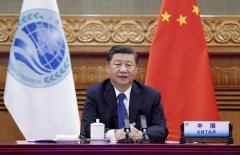Chinese authorities order video denials by Uyghurs of abuses
The Associated Press has found that videos of ethnic Uyghurs filming themselves denying human rights abuses are part of a Chinese government campaign that raises questions about the willingness of the participants
May 20, 2021, 4:02 AM
7 min read
A webpage with the title "Pompeo stop your slanders! Only We Xinjiang people have a say!" and videos of ethnic Uyghurs responding to former U.S. Secretary of State Mike Pompeo is seen on a computer screen in Beijing on Wednesday, May 19, 2021. China has highlighted an unlikely series of videos this year in which Uyghur men and women deny U.S. charges that Beijing is committing human rights violations against their ethnic group. In fact, a text obtained by the AP shows that the videos are part of a government campaign that raises questions about the willingness of those filmed. (AP Photo/Ng Han Guan)
URUMQI, China -- China has highlighted an unlikely series of videos this year in which Uyghur men and women deny U.S. charges that Beijing is committing human rights violations against their ethnic group. In fact, a text obtained by the AP shows that the videos are part of a government campaign that raises questions about the willingness of those filmed.
Chinese state media have published dozens of the videos praising the Communist Party and showing Uyghurs angrily denouncing former U.S. Secretary of State Mike Pompeo for declaring a genocide in the far west Xinjiang region. The videos, which officials have insisted are spontaneous outpourings of emotion, have also featured prominently in a series of government news conferences held for foreign media.
But the text obtained by AP is the first concrete confirmation that the videos are anything but grassroots. Sent in January to government offices in the northern city of Karamay, the text told each office to find one Uyghur fluent in Mandarin to film a one-minute video in response to Pompeo’s “anti-China remarks.”
“Express a clear position on Pompeo’s remarks, for example: I firmly oppose Pompeo’s anti-Chinese remarks, and I am very angry about them,” the text said. “Express your feelings of loving the party, the country and Xinjiang (I am Chinese, I love my motherland, I am happy at work and in life, and so on).”
While it’s not impossible officials were able to find Uyghurs willing to be in such a public relations campaign, China’s track record in Xinjiang and its documented abuses of Uyghurs have led many experts to conclude it's more likely those in the videos were forced to take part.
“There’s something instinctive about these videos which feels ingenuine, but the significance is that there’s hard evidence here that the Chinese government is requesting these kinds of videos,” said Albert Zhang, a researcher at the Australian Strategic Policy Institute who recently coauthored a report on Beijing’s disinformation campaign on Xinjiang.
Xinjiang spokesperson Xu Guixiang did not directly deny the authenticity of the text, but said it didn’t follow the usual format of state orders and that his understanding was that “the government has never issued this kind of notice or made this kind of request.” He suggested the videos were made voluntarily.
“This didn’t require government organization. Many among the masses made this totally spontaneously,” Xu said in a recent interview. “Pompeo’s anti-China remarks arose the intense resentment of various ethnic groups in Xinjiang.”
Beijing is increasingly under fire for its campaign of mass detention, cultural destruction and forced assimilation of Uyghurs and other largely Muslim minorities native to Xinjiang. Western governments have levied sanctions against top Chinese officials, while the U.S. government has banned imports of cotton and tomatoes from Xinjiang, citing concerns over forced labor.
Tahir Imin, a Uyghur activist who fled China in 2017, said the videos are almost certainly state-orchestrated and coerced, given that information in Xinjiang is heavily censored.
“People don’t know who Pompeo is or what he’s saying,” Imin said. “How would they know what Mike Pompeo is saying about the Uyghurs?”








